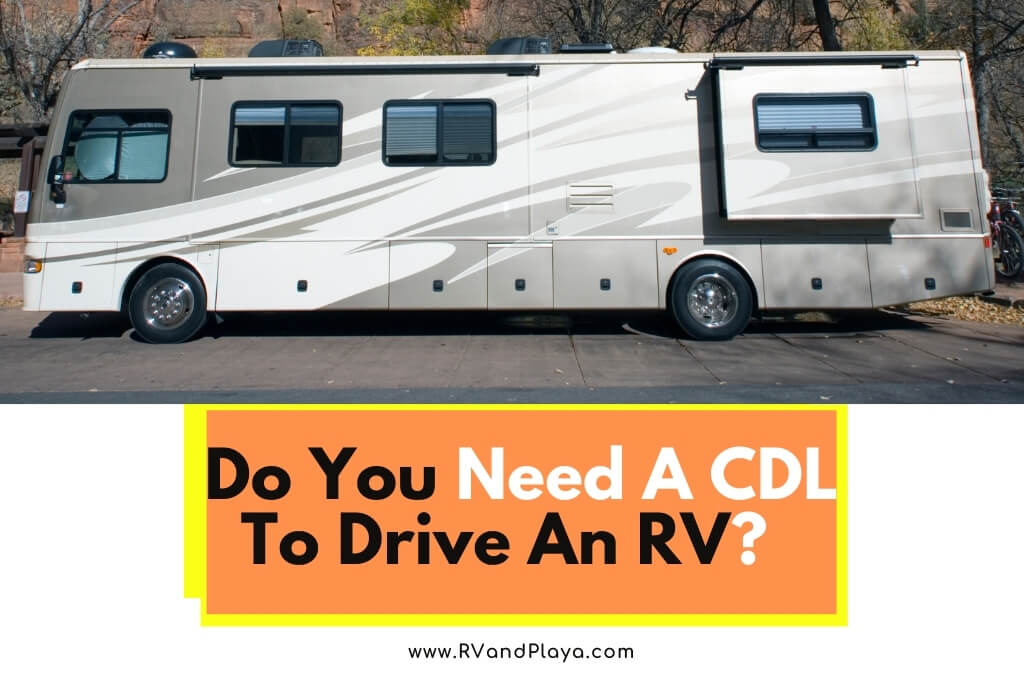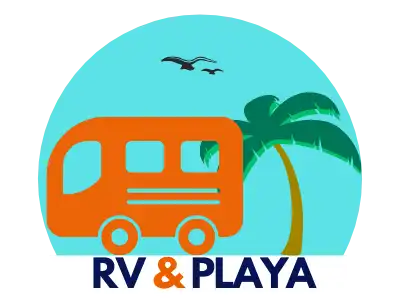Do you know if you need a CDL to drive an RV? this is one of the questions our readers ask a lot. Well, we´ve got you covered.
It’s a common, everyday experience to see an RV barreling down the interstate with a driver that could be anybody.
It’s easy to think that could be you, or maybe you’re actually in the market for one. What’s not so common is the understanding that some states require a bit more than a license to drive one.
So, do you need a CDL to drive an RV? Yes, you need a CDL to drive an RV in states like Arkansas, Hawaii, Washington, New Mexico, Wisconsin, and Connecticut. Most states require an A or a B if it’s over 26,000lbs or if it’s longer than 45 feet. Three states require an endorsement, and another seven states require a non-commercial. However, whether or not you have to have a CDL to drive an RV depends on what state you live in.
The remaining states have no requirements whatsoever. One day you could be driving a Volkswagen Beetle and on the next, you could be behind a Thor motor coach as a first-time driver.
Table of Contents
Which States Require An Endorsement Only?
Some states don’t necessarily classify it as an “endorsement” per se, but as a non-commercial driver’s license.
It basically means the same thing, however, and you have to have one to drive an RV that exceeds a certain weight or length limit.
Keep in mind that GVWR stands for Gross Vehicle Weight Rating and is a calculation of the total weight of the vehicle plus the maximum amount of weight that it can carry.
- Wyoming: Z-Endorsement for RVs over 39,001lbs Gross Vehicle Weight Rating (GVWR)
- Michigan: Doesn’t really qualify as an RV as its a “Double R” endorsement that is required if you’re towing a fifth-wheel in addition to a trailer
- New York: “R” endorsement only for RVs over 26,001lbs GVWR
Endorsements typically require the same—or a similar—set of prerequisites to obtain your endorsement as those who are seeking non-commercial driver’s licenses in other states.
You’ll have to undergo a written and possibly a physical driving test to obtain your endorsement. The endorsements often have to be renewed, with the period of renewal determined by the state that you live in.
Read also: How Much Weight Can You Tow Without A Commercial License
Non-Commercial Driver’s Licenses
These states require a separate, non-commercial driver’s license if you want to operate an RV that exceeds certain parameters.
Unlike endorsements, which just add a letter to your standard driver’s license, you’ll get a non-CDL when you complete the requirements.
- California: For RVs over 40’, you’re required to have a non-commercial, Class B driver’s license
- Kansas: Class B non-commercial license required for RVs over 26,001lbs GVWR and/or towing less than 10,001lbs GVWR/Class A for RVs over 26,001lbs GVWR and towing more than 10,001lbs GVWR
- Maryland: Class B non-commercial license to drive an RV over 26,001lbs GVWR
- North Carolina: Similar to Kansas/Class B for GVWR over 26,001 and a Class A for GVWR over 26,001 plus another vehicle (towed)
- Nevada: Similar to NC and Kansas/ Class B for a single RV over 26,001 GVWR and a Class A for multiple vehicles from which the combined weight exceeds 26,001 GVWR / Endorsement for towing anything above 10,001lbs GVWR
- Texas: Class B for an RV over 26,001lbs GVWR and a Class A for multiple vehicles whose combined weight exceeds 26,001lbs GVWR
- Pennsylvania: Class B for an RV over 26,001lbs GVWR and a Class A for multiple vehicles that exceed 26,001lbs GVWR
Many states are similar in their requirements because they simply followed the lead of other states.
Some don’t require a whole lot and the window between needing a non-CDL and not needing one can be pretty narrow, especially where Michigan is concerned.
Non-commercial driver’s licenses act in the same way as endorsements, giving you valid, state-authorized permission to operate an RV on that state’s highways.
All endorsements and/or non-CDLs are recognized across state lines no matter where you travel within the U.S.
Read also: What Are CDL Restrictions? (Codes, Endorsements, O, E, M, and L)
States That Require A Commercial Driver’s License
Some states treat RVs that exceed the 26,001lb limit as they would a standard Class B or Class A Commercial Driver’s License.
That’s regardless of the stipulations that typically exempt people from having to have one under federal guidelines.
Normally, any recreational use—do long as you aren’t crossing the narrow line of delivering anything for pay or operating in a commercial capacity—doesn’t require a Class A or a Class B CDL. Unfortunately, there’s always an exception and in this case, there are six of them.
- Hawaii: A Class B CDL is required for any RV over 26,001lbs GVWR and Class A is required for multiple vehicles that exceed the 26,001lb GVWR limit
- Arkansas: They keep it simple with a Class A CDL required for anything over 26,001lbs, recreational or otherwise
- Washington DC: Of course, DC isn’t actually a state, but we’re trying to keep it simple here. Like Hawaii, Class B is required for any RVs over 26,001lbs GVWR and Class A is required for multiple vehicles that exceed 26,001lbs GVWR
- New Mexico: Class B is required for RVs over 26,001lbs GVWR and Class A for multiple vehicles that exceed 26,001lbs GVWR
- Wisconsin: No weight limits here, but a Commercial Driver’s License is required for any vehicle that’s over 45’, including RVs
- Connecticut: Class B is required for RVs over 26,001lbs GVWR and Class A is required for more than one vehicle that exceeds 26,001lbs GVWR
When we use the terms “more than one vehicle that exceeds,” we are referring to an RV that’s towing another vehicle and both of the vehicle’s combined weights exceed 26,001lbs.
If you’re driving an RV that’s 25,000lbs GVWR and towing a vehicle that’s 5,000lbs GVWR, you fall into that category.
States That Do Not Require An Endorsement, CDL, Or Non-CDL
States that don’t require anything at all far outnumber the rest.
If you live in a state that does not require any special licensing to drive an RV that weighs over 26,001lbs, then you’re “non-requirement” is reciprocating across the country.
California won’t pull you over and give you a ticket or confiscate your RV if you’re a Florida resident, with a Florida Driver’s License, and you purchased your RV in Florida.
The following states do not require any additional licensing requirements:
- Alabama
- Alaska
- Arizona
- Colorado
- Delaware
- Florida
- Georgia
- Idaho
- Illinois
- Indiana
- Iowa
- Kentucky
- Louisiana
- Maine
- Massachusetts
- Minnesota
- Mississippi
- Missouri
- Montana
- Nebraska
- New Hampshire
- New Jersey
- North Dakota
- Ohio
- Oklahoma
- Oregon
- Rhode Island
- South Dakota
- Tennessee
- Utah
- Vermont
- Virginia
- Washington
- West Virginia
If you live in one of these thirty-four states, congratulations. You can pick out an RV that could double as a dump truck on top of a bulldozer and drive cross country with it.
That’s on top of the normal protections for what the federal government considers to be “recreational use.”
Realistically speaking, there aren’t a lot of RVs out there that actually weigh more than 26,001lbs. Not even all Class A Recreational Vehicles weigh that much.
Much of the licensing requirements in other states are going to come from the combined weight of an RV and whatever it is towing.
Read also: Do You Need A CDL To Drive A Pickup And Trailer (Best Tips!)
All Things Considered
Now that you know the stipulations for each state, you have a better idea of what you should look for when purchasing an RV in a particular state.
If you don’t feel like jumping through hoops at your local DMV to get a special endorsement or obtain a CDL—and honestly, who would?—keep the RV under 26,001 GVWR or keep it low enough that whatever you may tow doesn’t exceed the limit either.
Here are some of my favorite services, products, and Stores
Thank you for reading this article. I hope it helps you find the most recent and accurate RV, camping information. Here are some services, products, and Stores that I use and hope you´ll also find helpful.
There are affiliate links, so if you do decide to use any of them, I´ll earn a small commission. But in all honesty, these are the exact what I use and recommend to everyone, even my own family.
To see all my of most up-to-date recommendations, check out this resource that I made for you!
References
https://www.thesenagroup.com/2019/07/14/need-special-license-drive-rv/
https://www.mhs2go.com/do-i-need-a-special-license-to-drive-a-class-a-or-class-c-motorhome/
Recent Posts
Do you know what the Class B CDL Max Weight limit is? this is one of the questions our readers ask a lot. Well, we´ve got you covered. It generally takes between 4 and 8 weeks to obtain a...
What's The Longest Trailer You Can Pull Without A CDL? (Explained)
Have you ever wondered what´s the longest trailer you can pull without a CDL? Look no more. We´ve got you covered. We are not going to lie to you here. The Commercial Driver License (CDL) laws...


